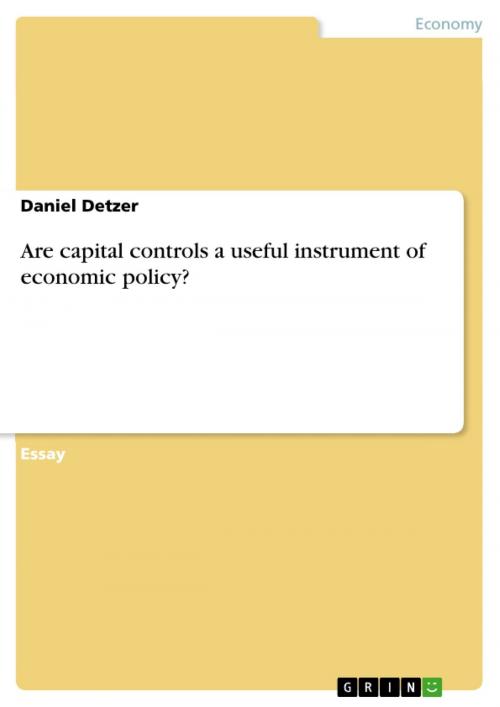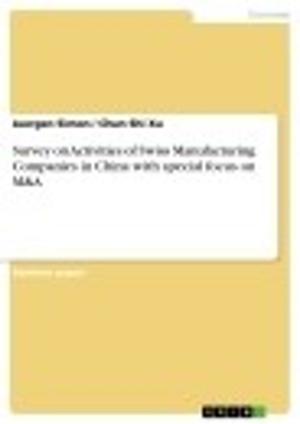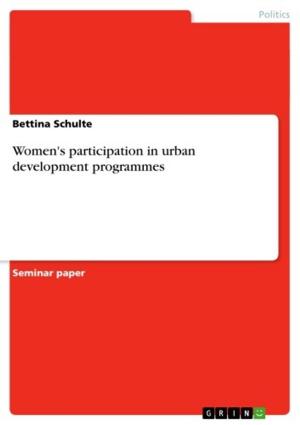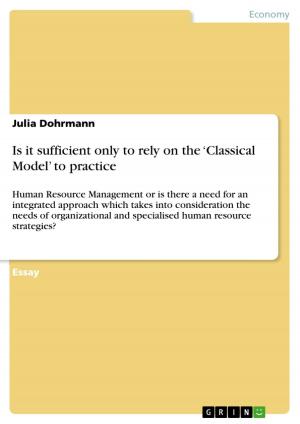Are capital controls a useful instrument of economic policy?
Business & Finance, Economics, Money & Monetary Policy| Author: | Daniel Detzer | ISBN: | 9783640660353 |
| Publisher: | GRIN Publishing | Publication: | July 13, 2010 |
| Imprint: | GRIN Publishing | Language: | English |
| Author: | Daniel Detzer |
| ISBN: | 9783640660353 |
| Publisher: | GRIN Publishing |
| Publication: | July 13, 2010 |
| Imprint: | GRIN Publishing |
| Language: | English |
Essay from the year 2010 in the subject Economics - Monetary theory and policy, grade: 1,3, Berlin School of Economics and Law, course: International Trade and Monetary Economics, language: English, abstract: 'Loose funds may sweep round the world disorganizing all steady business. Nothing is more certain than that the movement of capital funds must be regulated' Keynes, J.M. Already Keynes warned against a free movement of capital. Those warnings were taken seriously by the international community and the IMF allowed in its articles the use of capital controls. The attitude towards those controls changed remarkably during the 1980`s when a general trend towards deregulation occurred. This trend peaked in an attempt to include the purpose of liberalizing capital movements in the Articles of Agreements of the IMF. Coinciding with the Asian Crisis, parts of the academic profession heavily opposed this idea and eventually, some of the fund`s representatives revised their general opposition against capital controls. Nonetheless, in big parts of the academic profession, capital controls carry a negative smack and the ultimate goal of free capital flows is promoted. With the financial crisis, however, capital controls came into vogue again. Recently, Brazil introduced a tax on foreign portfolio investment. Also at the G20 level, ways on how to regulate international capital flows are discussed. Whether this should be seen as a desirable development or not, boils down to the question if capital controls are a useful instrument of economic policy? In general capital controls are any kind of policy that limits or redirects capital account transactions. So, the above mentioned question can be answered by looking at the situation of a fully liberalized capital account with its associated cost and benefits and see if state intervention in form of capital controls would be able to improve the situation. This discussion shall first rest on theoretical considerations and outline possible benefits of free capital flows. Thereafter, an important assumption, namely the Efficient Market Theorem, which allows for the prediction of those benefits, will be discussed. Subsequently, by dropping the EMT and introducing Keynesian uncertainty an alternative scenario is drawn and the effect of capital controls within this framework is examined. After this, some of the empirical research regarding the benefits of free capital flows will be examined and some of the areas where capital controls can play a beneficial role are introduced to the reader. Finally, the insights gained in the course of this paper will be summarized and an answer to the stated question will be given.
Essay from the year 2010 in the subject Economics - Monetary theory and policy, grade: 1,3, Berlin School of Economics and Law, course: International Trade and Monetary Economics, language: English, abstract: 'Loose funds may sweep round the world disorganizing all steady business. Nothing is more certain than that the movement of capital funds must be regulated' Keynes, J.M. Already Keynes warned against a free movement of capital. Those warnings were taken seriously by the international community and the IMF allowed in its articles the use of capital controls. The attitude towards those controls changed remarkably during the 1980`s when a general trend towards deregulation occurred. This trend peaked in an attempt to include the purpose of liberalizing capital movements in the Articles of Agreements of the IMF. Coinciding with the Asian Crisis, parts of the academic profession heavily opposed this idea and eventually, some of the fund`s representatives revised their general opposition against capital controls. Nonetheless, in big parts of the academic profession, capital controls carry a negative smack and the ultimate goal of free capital flows is promoted. With the financial crisis, however, capital controls came into vogue again. Recently, Brazil introduced a tax on foreign portfolio investment. Also at the G20 level, ways on how to regulate international capital flows are discussed. Whether this should be seen as a desirable development or not, boils down to the question if capital controls are a useful instrument of economic policy? In general capital controls are any kind of policy that limits or redirects capital account transactions. So, the above mentioned question can be answered by looking at the situation of a fully liberalized capital account with its associated cost and benefits and see if state intervention in form of capital controls would be able to improve the situation. This discussion shall first rest on theoretical considerations and outline possible benefits of free capital flows. Thereafter, an important assumption, namely the Efficient Market Theorem, which allows for the prediction of those benefits, will be discussed. Subsequently, by dropping the EMT and introducing Keynesian uncertainty an alternative scenario is drawn and the effect of capital controls within this framework is examined. After this, some of the empirical research regarding the benefits of free capital flows will be examined and some of the areas where capital controls can play a beneficial role are introduced to the reader. Finally, the insights gained in the course of this paper will be summarized and an answer to the stated question will be given.















